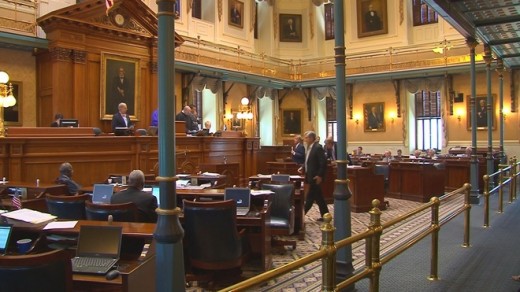
‘We deem this bill to be constitutional,’ says bill about itself
If you happen to be one of the very few unfortunate souls who has actually read the “roads bill” recently passed by the legislature, let us just summarize. This unwieldy 42-page, 15,000-word monstrosity funds road expansions with debt and rearranges the Department of Transportation in such a way that the governor will (a) have no power to change anything but (b) will get blamed for the agency’s mistakes and poor performance.
Enough has been said and written about the new law already. (It was signed by the governor on June 8.) Its “reform” component is pretty well summarized here. Its funding component (that part of the bill was incorporated very late in the process) is analyzed here. And if you want to read the bill itself – although we would not wish such a thing on anyone, including the bill’s sponsors – you may do so here.
There is one short line in the legislation, however, that we thought sufficiently interesting to comment on. The line is meaningless in a sense, but also indicative. Section 89 reads:
The General Assembly finds that the sections presented in this act constitute one subject as required by Section 17, Article III of the South Carolina Constitution, 1895, in particular finding that each change and each topic relates directly to or in conjunction with other sections to the subject of improving the state’s transportation infrastructure system as clearly enumerated in the title.
What’s going on here? The short answer: The state constitution requires that each bill only address one topic, and the “roads bill” may address two – it’s an appropriations bill and a government restructuring bill at the same time.
The practice of inserting unrelated or “non-germane” language into legislation is known as “bobtailing.” Although it violates the spirit of parliamentary democracy – and, as the roads bill’s authors were aware, the state constitution – bobtailing is a longstanding practice in the South Carolina General Assembly. Indeed, state lawmakers have abused the practice so frequently that the state Supreme Court has rebuked the legislature on three separate occasions. In the first of these, then-Gov. Mark Sanford and then-Attorney General Henry McMaster actually joined a lawsuit filed by Ned Sloan against the legislature that contended that the so-called Life Sciences Act – at the time known as the “kitchen sink act” – was unconstitutional.
The constitution’s requirement is plain. “Every Act or resolution having the force of law shall relate to but one subject, and that shall be expressed in the title” (Article 3, section 17).
Despite three separate Supreme Court rebukes, however, that provision is routinely and flagrantly ignored. That is, except when legislative leaders feel it’s to their advantage to abide by the constitution – i.e. when they want to kill a bill. Then it’s adhered to rigorously.
What seems to us remarkable, though, is that the legislature has now taken to usurping the judiciary’s authority by deeming their own bills constitutional. So extensive has the legislature’s hegemony become that lawmakers feel they can go ahead and declare their bills constitutional so the Supreme Court doesn’t have to.
A little fancy Googling found that lawmakers have been slipping this language into their bills a lot recently. The earliest instance we were able to find dates from 2005.
We wonder: Since the legislature evidently feels it can decide the constitutionality of legislation all by itself, why bother with the court? After all, lawmakers unilaterally appoint judges anyway. Why not do away with the charade altogether?
(That last paragraph was meant in jest. It’s not to be taken seriously during next year’s legislative session.)
